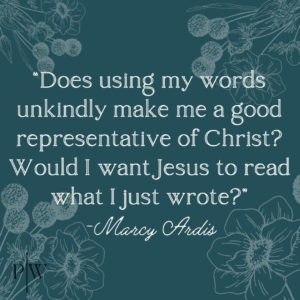Our words are powerful. They can heal a broken heart or tear someone’s dreams to pieces in a heartbeat. As little children we are taught to be careful what we say because of how our words can impact others. James 3:6 says, “And the tongue is a fire, a world of unrighteousness. The tongue is set among our members, staining the whole body, setting on fire the entire course of life,and set on fire by hell.” Who among us has not been burned by unkind or thoughtless words?
Somehow though, when we get behind the shield of our laptops or phones, we often don’t think twice about writing and posting something that can cut the person who reads it to the very heart. The written word is just as powerful as the spoken word, perhaps even more so, because we can choose to reread the hurtful things that are posted on social media. A thoughtlessly written word can quickly become inflammatory, causing grief and unknown pain to people who were never even the intended audience when it was posted.
A few months ago I was scrolling on Facebook and I came across a post, written in the form of a question, that had been posted by a very well known Christian resource group. The question that was posted was very simple, and also incredibly divisive. The post read, “What advice would you give moms in the workplace?” I knew I should have scrolled right past it, but I didn’t. Immediately, as I read the question, I was upset and, before I knew it I had spent several minutes reading though bitter, angry, and, it must be said, a lot of holier-than-thou responses from both sides of the debate.
Although I am now a stay-at-home, homeschooling pastor’s wife, for most of my adult life I worked as a secondary school teacher. I did not stay home when my daughter was born but chose to keep working because my salary was needed in order for my husband to continue pastoring at our two small, rural churches. Truth be told, I also enjoyed many aspects of my job and, to this day, I still miss my students. I give you this background so you can more clearly understand why I was uncomfortable with the question that was asked in the post.
The comments on the post were incendiary. “Quit. Go home and work for your husband as the Lord designed.” “Go home if at all possible. Homeschool your children. Save the career focus until after the kids are grown.” “Quit and follow Scripture! You can work when the kids are grown” and in response to this, “If I quit my kid won’t have a home, or insurance, or food, or running water… but I mean, if you say so.” “Stay home and raise your children.” “Please don’t feel guilty because you have or want to work and don’t compare yourself to moms who don’t work. It will all be okay.” “Take it easy mommy. Don’t be too hard on yourself.” “Stay away from other dads.” “Go home and don’t feel bad about it.” “Figure out what you need to cut to stay home with your babies.” “Go home and take care of your children, your husband, and your home. It can be done on one income.”
As of today, over one thousand people have posted a response to this question. Most of the responses were civil but there were many hurtful comments from both sides of the argument. The thing that really bothered me about this was that I felt that whoever posted the question knew that it would lead to hurtful responses. They knew that the question would cause division.
How could it not? It’s totally okay to disagree with one another, but asking a polarizing question like this when people can hide behind the safety of their keyboards was bound to lead to mud-slinging. Why would a well-known Christian resource organization choose to cause dissension among its followers?
While I will probably never have an answer to my question, this post has served as a helpful reminder to me of the importance of carefully considering any online content I post. It is so easy to write something in the heat of the moment and push the post button without stopping to consider the deeper ramifications of my words. I don’t want something I post to hurt someone else. Words can be damaging and we can’t continue to fool ourselves into thinking that what we post online has no impact. Of course it does, even if those results were unintentional on the writer’s part. Writing something on social media is no different than saying it out loud. The words, when they are not carefully chosen, can have the same devastating consequences.
In 2 Timothy 2:22-24a Paul writes, “So flee youthful passions and pursue righteousness, faith, love, and peace, along with those who call on the Lord from a pure heart. Have nothing to do with foolish, ignorant controversies; you know that they breed quarrels. And the Lord’s servant must not be quarrelsome but kind to everyone.” I think this is a really good standard on which to base our choice of social media posts. Before posting I can ask if what I have written demonstrates righteousness, faith, love, and peace. Or, instead am I posting something that will either create or deepen a controversy or lead to quarreling? Finally, is what I am choosing to post kind? When I see something I disagree with and I cannot respond in kindness, do I really need to respond? Will it really make me feel better to know I am writing something that is going to probably hurt someone else? Does using my words unkindly make me a good representative of Christ? Would I want Jesus to read what I just wrote?


